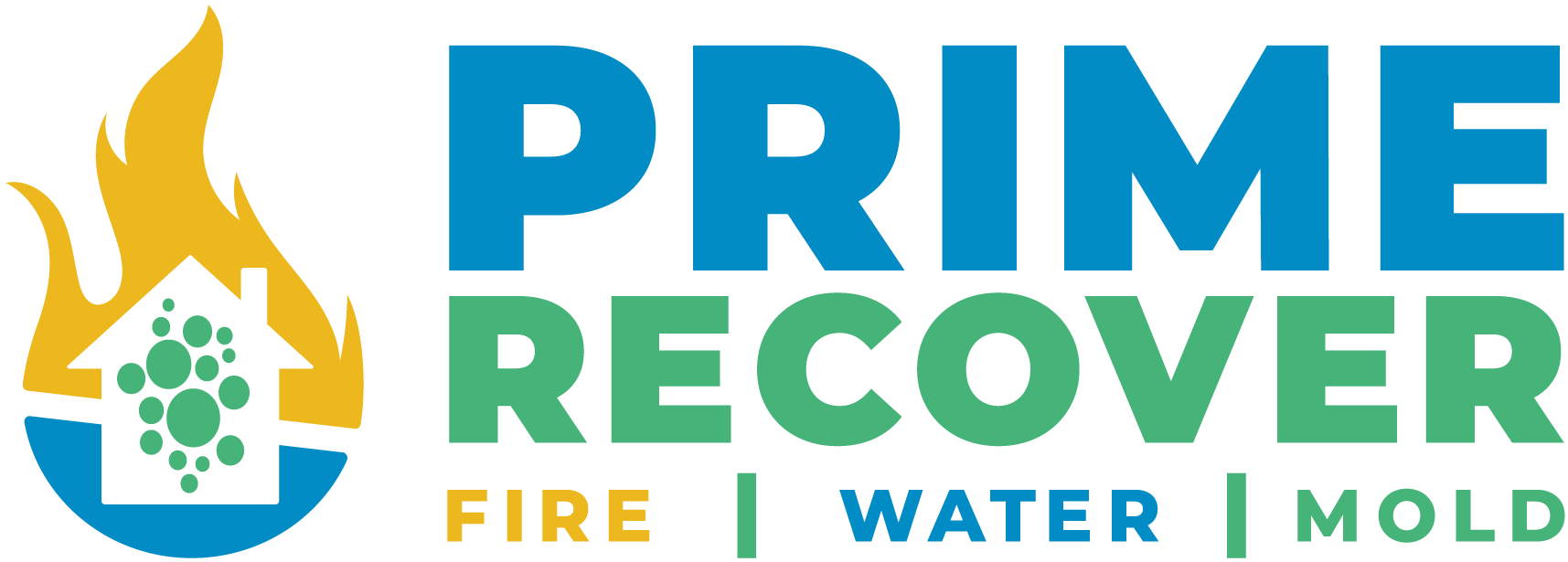1. Prioritize Personal Safety
Your safety—and the safety of anyone else on the property—should always be your first concern.
- Evacuate if Necessary: If a fire is still active or the flooding poses immediate danger, get everyone out of the building until authorities say it’s safe.
- Check for Hazards: Floodwaters can be contaminated with chemicals or sewage, and structural integrity could be compromised after a fire. Use caution entering any affected areas.
Prime Recover Tip: Always follow the instructions of local emergency services. Never return to a fire- or flood-damaged area until professionals have declared it safe.
2. Contact Emergency Services & Utility Companies
Depending on the severity of the situation, you may need more than just remediation services right away.
- Call 911 for Ongoing Emergencies: If there’s active fire or severe flooding, ensure the fire department or local authorities are aware.
- Shut Off Utilities If Safe to Do So: Flooding and fire both create conditions where gas or electrical lines become hazards. Contact utility companies to turn off power or gas if you can’t do so safely yourself.
Prime Recover Tip: After a fire, scorched wiring can spark secondary fires. Similarly, water can corrode electrical systems. Always err on the side of caution and keep your distance from potentially compromised utilities.
3. Document the Damage
Once you’re sure there’s no immediate danger, begin documenting the damage to streamline insurance claims and remediation efforts.
- Take Photos & Videos: Capture every angle—walls, floors, furniture, personal belongings. If your phone’s camera is operational, this documentation can be invaluable.
- List Affected Items: Creating a detailed inventory of damaged possessions helps with insurance and may speed up the restoration process.
Prime Recover Tip: Even seemingly minor details matter. Water stains or char marks in less-visible areas can be important when assessing the full scope of damage.
4. Notify Your Insurance Provider
Contact your insurance company as soon as possible; many policies require prompt reporting.
- Provide Initial Details: Let them know whether the damage is from a fire or a flood, the extent of the damage, and if you’ve already taken any protective measures.
- Ask About Temporary Housing or Business Relocation: If your property isn’t safe to occupy, inquire about policy coverage for temporary living arrangements or business space.
Prime Recover Tip: Keep a record of calls and emails. Jot down names, call times, and reference numbers to avoid confusion later.
5. Mitigate Further Damage
If you can do so safely, take immediate steps to prevent additional harm to your property.
- Open Windows for Ventilation (After Fire): Clearing smoke and fumes can reduce lingering odor and health risks. However, only do this once the fire department has given you the green light.
- Remove Standing Water (Post-Flood): If water levels are low and there are no electrical risks, you may try mopping up excess water. Never use household appliances when they or their outlets could be wet.
- Place Tarps or Boards Over Damage: For fire-damaged roofs or windows, covering openings can keep out rain and intruders.
Prime Recover Tip: Never attempt complex tasks—like structural repairs or thorough water extraction—on your own. Improper handling can worsen the situation.
6. Contact a Trusted Remediation Company (Prime Recover)
Time is of the essence following a flood or fire, so it’s crucial to bring in professional help quickly.
- 24/7 Availability: We’re here round the clock because disasters don’t follow a 9-to-5 schedule.
- Immediate Assessment: Our team will evaluate the extent of the water, smoke, and structural damage. We then create a comprehensive plan to restore your property as efficiently as possible.
- Safety Protocols: Prime Recover follows rigorous industry standards, using protective equipment and specialized tools to ensure a safe environment throughout the remediation process.
Prime Recover Tip: Prompt professional intervention reduces the chance of secondary problems, like mold in the wake of flooding or unseen structural damage after a fire.
7. Secure the Property
After a fire or flood, your property is often vulnerable to weather, vandalism, and theft.
- Board-Up & Tarp Services: Once our team arrives, we can quickly fortify doors, windows, and rooftops to keep out external elements or potential trespassers.
- Temporary Fencing or Security: If necessary, we’ll recommend additional measures—like security fencing—to keep your property secure and intact while the restoration unfolds.
Prime Recover Tip: Even partial closures or barricades can significantly deter unwanted visitors and protect your home or business from further intrusion or damage.
8. Prepare for the Restoration Process
Once the initial crisis has passed, the real restoration work begins. Here’s what to expect:
- Water Extraction & Drying (Post-Flood): Excess water is removed, and we use industrial-grade dehumidifiers and air movers to prevent mold and structural decay.
- Soot & Smoke Removal (After Fire): Smoke residue can be corrosive; immediate removal prevents long-term damage to walls, flooring, and possessions.
- Cleaning & Sanitization: We thoroughly clean and disinfect the affected areas to eliminate contaminants, odors, and potential biohazards.
- Repair & Reconstruction: From replacing drywall to rebuilding structural components, we restore your property to its pre-disaster condition.
Prime Recover Tip: Open communication is at the heart of our approach. We keep you updated on the timeline, challenges, and successes of each phase—so you’re never in the dark.
9. Follow Up & Preventive Measures
After restoration, Prime Recover continues to support you:
- Final Inspection: We confirm that moisture levels are normal (post-flood) or that structural and air quality measures meet our standards (post-fire).
- Insurance Coordination: We can help you prepare final documentation for your insurer, ensuring the claims process proceeds smoothly.
- Preventive Insights: We share tips to safeguard against future disasters—like installing sump pumps or smoke alarms, improving ventilation, or learning where to shut off utilities in an emergency.
Prime Recover Tip: Disasters are unpredictable, but being prepared and informed can significantly reduce stress if something does occur. A little forethought goes a long way.
Georgia Home Flood Experts
Facing a flood or fire can feel overwhelming—but at Prime Recover, we’re dedicated to guiding you through each critical step immediately after disaster strikes. By prioritizing safety, documenting damage, and engaging professional remediation services without delay, you’ll minimize further harm to your property and pave the way for a smoother recovery.
If you ever need help, remember that Prime Recover is just a phone call away—ready to restore not only your property but also your peace of mind.



